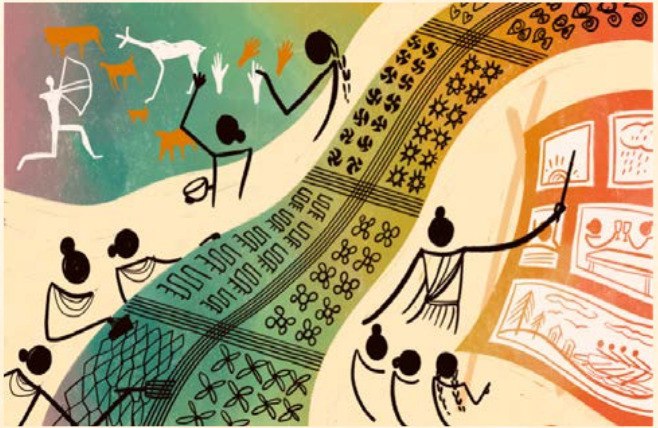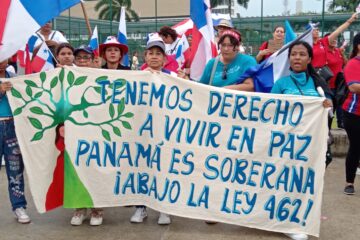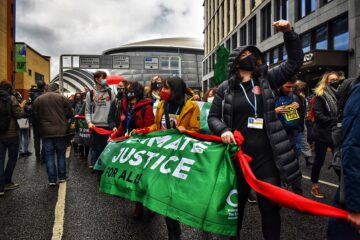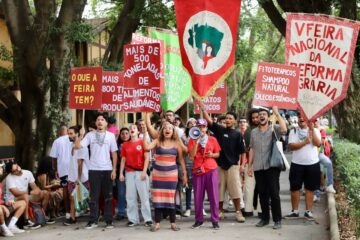The global political and economic context is a territory of struggle that challenges us to strengthen social movements and find ways to resolve the grave problems that we experience and face on a daily basis. Constituting ourselves as political and social subjects and advancing in our proposals continue to be challenges, which is why political formation and formation processes are strategic actions and decisions of social movements, that strengthen the organization, articulation, and construction of movements that are capable of changing the reality in which we live and building an alternative for life.
In a very adverse global context of pandemic, but with many signs of hope and strength coming from the people – grassroots women, Indigenous and Afro-descendant peoples, LGBTQ2S+ and non conforming people – we developed the Berta Cáceres International Feminist Organizing School (IFOS) in 2021, a feminist political formation school for compañeras and compañeres who exercise their leadership in organizations such as the World March of Women, the Indigenous Environmental Network (IEN), Grassroots International and Grassroots Global Justice Alliance (GGJ). The school’s objectives are to develop the thinking and political understanding of the global reality for grassroots communities, women, LGBTQ2S+ and non-gender conforming people, strengthen alliances and organizing work, and propose a feminist economy as an alternative to the neoliberal capitalism that currently exists, and that is destroying the world.
With the development of the curriculum of this school, and its publication in March 2022, the conditions were ripe to develop a School for Facilitators as a complementary process. This second process focused on enriching the knowledge and experiences of the participants to facilitate contextualized formation processes in their own communities and regions. It was directed above all to the compañeras and compañeres who had participated in the school in 2021, so that with the experience they gained in Popular Education, they could assume the commitment to promote and facilitate formation processes in their own organizations, based on the political formation content of the Berta Cáceres International Feminist Organizing School.
With the aim of expanding and strengthening the knowledge of the compañeras and compañeres in decolonial feminist Popular Education, from April to August 2022 we organized and developed the formation process for facilitators in five languages. In total, 105 compañeras and compañeres from 38 countries of the Americas, Africa, Europe, the Middle East and Asia enrolled. However, due to lack of time, job changes, work overload or illness, among other reasons, 61 compañeras and compañeres, or 58% of those enrolled, completed the entire process.
As we already know, the use of Popular Education methodology in formative processes implies enriching the knowledge and experiences that we all have to prepare ourselves to live new experiences. In turn, through a process of systematization and synthesis of these experiences, the knowledge we already have and even the content of the school itself, are expanded. We hope that this political idea will allow us to generate contextualized processes to continue enriching everyone’s experience, and that this experience will be another contribution to our struggles.
We are certain that we will achieve what this process started with the 2021 school, that our efforts will multiply in different territories of the planet and in different communities in struggle, given that we are all participants in organizations and/or communities that work to address the problems that we face, and we are all in the fight to overcome them. In fact, during the course of the school, some of the compañeras and compañeres made follow-up proposals to this process, where they would facilitate their own versions by utilizing the school’s curriculum in their regions or in their own communities. The continuation of these practices will also follow up on the connections developed between the participants during the school, or within the alliances they already have at the local level, which will contribute to strengthening the popular feminist movement, from the local to the global.
In this book there is a compilation of materials on feminist and decolonial Popular Education, including a reflection for pedagogical mediation, as well as methodological guides and workshops. This compilation is a contribution for all people who use Popular Education as a tool for formative processes in their communities. In addition, you will find the different syntheses that were developed during the course of the school, that account for the reflections and collective knowledge that was built by everyone. Finally, we also share some practical ideas on how to develop political formation workshops of the Berta Cáceres School, which is the objective of these schools. We hope that these contributions guide the work of those of us who are on this path of struggle and transformation towards a dignified life in another possible world.
Sandra Morán

Pedagogical Mediation in a Workshop
Gina Alfonso
I would like to share with you the experience of what constitutes, in a formative process, attending to pedagogical mediation. The first thing is to understand that every formative process is a pedagogical process, that is, it is an educational process of learning and unlearning, both for those who participate as students and for the people who will facilitate as coordinators or teachers of these processes. Pedagogy is a creative process where all the people who participate, in one way or another, and from different responsibilities, are transformed. Therefore, in a process of pedagogical mediation, one of the main elements to be considered is what will be the responsibility, what will be the task, how the creative process will be organized, and how the knowledge will be assimilated from the life experiences of the people who participate in this formative process.
Therefore, the first pedagogical criterion to be considered in an educational formative process are the life experiences, the accumulated knowledge-wisdom, and the critical capacity for evaluation of those who participate in this process.
In the case of the processes in which we have experiences and that are based on the methodology of Popular Education, we must always pay attention to the dialogic element, the debate, and the exchange of opinions that allow us to build, in the formation process, a collective knowledge-wisdom, a collective dialogue. For this, we need to maintain elements for participation, whereby each person, from his or her own experience, [contributes] aspects [to] the axis of that formation process, of that pedagogical process, [and] by which people feel that they are building it. Every formation process, every pedagogical process, is a creative process; it is a process in which
the assessments of the people who participate in it, based on their own life experiences, are exposed all the time. New knowledge is constructed, not imposed. [The] pedagogical capacity of those who lead the pedagogical process lies precisely in knowing how to pull the different threads that are put in the process of building the formation process towards the objective that one wants to achieve and then, to make an objective, a common collective construction, so that the objective that one sets in the formation process is assimilated by all the people who participate in it.
When in a formation process one overlooks or does not consider the life experiences and accumulated knowledge-wisdom, one simply loses the opportunity for this pedagogical process, this educational or formative process, whatever we want to call it, to be consciously assimilated by those who participate in it. What is essential in a formation process is to facilitate the conscious assimilation of what is being discussed, what is being constructed, and the new knowledge. Formation processes must face a logic of domination where one comes with a piece of
knowledge to impose a [certain kind of] knowledge; where there is one sole voice of knowledge that is going to say how the process should be built or how the process should be done. That is why it is important, in this pedagogical mediation, to define collectively what the lines of work will be, and what are the pedagogical assumptions that are going to be assumed and assimilated by those who participate in this formation process. So, to synthesize, we are saying [that], as [an] element of pedagogical mediation, it is important to consider the critical capacity of those who participate in it. The possibility of dialoguing from that critical capacity with the experiences lived by the
participants… the dialogic sense must be a sense for the creation of new knowledge, to put in all the knowledge-wisdom we have in common and, at the same time, to reach, in that formation process, an objective that allows us all to advance towards more emancipating, more liberating transformation processes; and that we can collectively confront the sole way of thinking.




